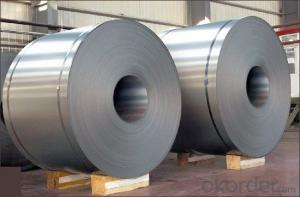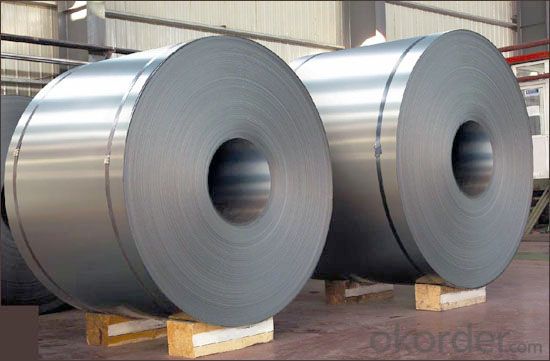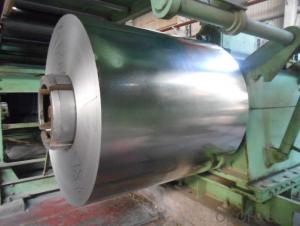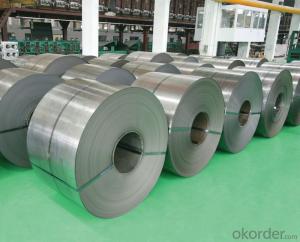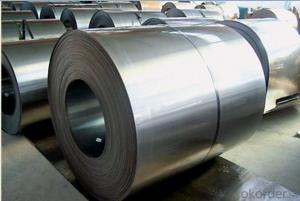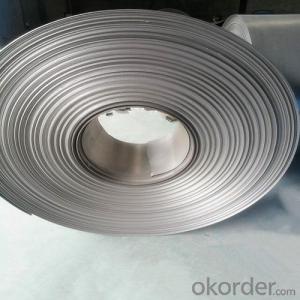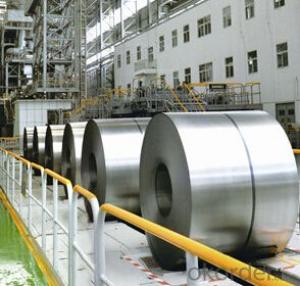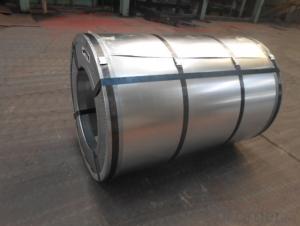BEST COLD ROLLED STEEL COIL WITH HIGH QUALITY AND COMPETITVE PRICE NO.1
- Loading Port:
- Shanghai
- Payment Terms:
- TT OR LC
- Min Order Qty:
- 50 m.t.
- Supply Capability:
- 5000 m.t./month
OKorder Service Pledge
OKorder Financial Service
You Might Also Like
Cold rolled steel is the based material for galvanized steel coil and pre-painted galvanized steel coil. It is widely used in light industry for marking tank, furniture, refrigerators, washers, freezer plate, air conditioner, micro-wave oven, water heater, soot such machine etc.
Main specification:
COLD ROLLED STEEL | |
Thicknenss | 0.10mm-4.00mm |
Width | 600mm-2000mm |
Sheets length | 1200-6000mm |
Coil inner diameter | 508-610mm |
Surface treatement | matt finish/bright finish,oiling/dry, bright anneal/black anneal |
Coil weight | 3-5t |
We can supply customers' with different specifications of the highest quality and lowest price.
With excellent cold bending molded manufacturablity, good decoration effect, strong anti-corrosion ability, galvanized steel coils and sheets are also pollution-free and easily recycled. Accordingly, they can be used as final products and basic plates of color coated steel coils.
Sincerely welcome to contact us for the future details if any item interest you ,and we will make every effort to assure that your requirements will be satisfied ,and we hope to establish long-term business relations with you on the basis of the equality and mutual benefit.
We are waiting for your email.
- Q: What is a steel coil?
- A steel coil is a long, continuous strip of flat-rolled steel that is wound into a coil shape. It is typically used in various industries, such as automotive, construction, and manufacturing, for making a wide range of products, including pipes, tubing, roofing, appliances, and automotive parts.
- Q: I'm looking to buy the Milano Stiletto, and it uses 1045 steel. I was just wondering whether this will hold up and keep an edge.
- Unfortunately, okorder /
- Q: What are the main factors that affect the quality of steel coils?
- The main factors that affect the quality of steel coils include the composition and purity of the steel used, the manufacturing process and techniques employed, the temperature and time of the heat treatment, the level of mechanical stress and strain during rolling and cooling, and the presence of any impurities or defects in the final product.
- Q: Can you weld copper or brass to steel?
- This Site Might Help You. RE: Welding question Can you weld copper or brass to steel? Can you weld copper or brass to steel?
- Q: How are steel coils used in the manufacturing of roofing materials?
- Steel coils are used in the manufacturing of roofing materials as they serve as a primary raw material for producing metal roofing sheets and tiles. These coils are processed through a series of steps such as cleaning, coating, and shaping to create durable and weather-resistant roofing products. The steel coils are rolled out and cut into the desired size and shape, ensuring uniformity and precision in the manufacturing process. These roofing materials made from steel coils offer exceptional strength, longevity, and protection against various weather conditions, making them a popular choice for residential and commercial buildings.
- Q: How are steel coils used in the production of roofing sheets?
- Roofing sheets cannot be produced without steel coils, as they are an integral part of the manufacturing process. These coils are typically composed of high-quality steel, which is renowned for its strength, durability, and resistance to corrosion. To convert these coils into roofing sheets, several steps must be followed. To begin, the steel coils are loaded onto a machine known as a decoiler. This machine effortlessly unrolls the coils, allowing them to be fed into the production line. By doing so, the decoiler guarantees a continuous supply of steel, ensuring an uninterrupted manufacturing process. Subsequently, the steel coils pass through a series of rollers. These rollers are responsible for molding the steel into the desired shape, which is specific to the type of roofing sheet being produced. Depending on the project's requirements, the rollers can create various profiles, such as corrugated or standing seam. Once the shaping process is complete, the steel sheets often receive a protective coating. This coating, which can be zinc or other metallic alloys, is referred to as galvanized or galvalume coatings, respectively. These coatings provide an extra layer of defense against rust and corrosion. Following the application of the protective coating, the sheets are generally cut to the desired dimensions. This can be achieved using shearing machines or other cutting tools, ensuring that the roofing sheets are appropriately sized for installation. Finally, the roofing sheets are carefully packaged and prepared for transportation to construction sites. They are typically bundled together and securely wrapped to safeguard them during transit. In conclusion, steel coils play a vital role in the production of roofing sheets. Through shaping, coating, cutting, and packaging processes, these coils are transformed into finished products ready for installation. By utilizing steel coils, roofing sheets are rendered strong, durable, and resistant to various environmental factors, making them a popular choice in roofing applications.
- Q: How is the quality of steel coils determined?
- The quality of steel coils is determined by various factors such as the chemical composition, mechanical properties, surface finish, and dimensional tolerances. These factors are assessed through rigorous testing and inspections, including chemical analysis, tensile testing, hardness testing, visual inspection, and dimensional measurements. Additionally, industry standards and specifications play a crucial role in determining the quality of steel coils by setting specific requirements that the coils must meet.
- Q: I know that the steel is significantly harder than when air cooled, but why is the quenched steel harder?
- When steel is slowly cooled, lots of carbon diffusion takes place because it is not very soluble in steel at room temperature. The carbon is in solution at high temperatures, and is rejected out of the lattice as it cools. And when this happens, the microstructure will consist of ferrite and pearlite, and the lattice structure will be base centered cubic (bcc). If it is cooled fast enough, then the carbon gets trapped in the interstitial sites of the lattice and distorts it to a body centered tetragonal (same as bcc, but elongated in one direction) This elongation strains the lattice and makes it harder. Also, when cooled fast enough the atoms do not have time to diffuse like they normally would and they shear into place. This forms the hard phase of martensite that is desired of heat treated steel. But then it must be tempered back some because it is too brittle.
- Q: Well actually I was just wondering why people were bashing on stainless so much for katanas. I heard that they don't hold their edge as well as carbon steel blades or Damascus steel. So what makes it so inferior to carbon or other types of steels?
- There are many kinds of stainless steel. 440c, 420j, ATS34, and so on. Cold steel uses 420 type steels in several of their products. High carbon stainless steels cut well but edge retention is not very good but that also depends on the heat treating of the metal. I could go on all day but very, very basically stainless steels lack the shatter resistance necessary when stretched to great lengths. This is in part why other steels make far better swords. The stuff sold on QVC is just plain junk. Do not buy a stainless steel sword. A blade made of 440S means it belongs hung on a wall...
- Q: How are steel coils used in the manufacturing of doors and windows?
- Steel coils are used in the manufacturing of doors and windows as they provide the necessary strength and durability required for these products. The coils are first processed and shaped into the desired form, which is then used as the base material for constructing the frames and panels of doors and windows. The steel coils also undergo various treatments, such as galvanization or coating, to enhance their resistance to corrosion and weathering. Overall, steel coils play a crucial role in ensuring the structural integrity and longevity of doors and windows.
Send your message to us
BEST COLD ROLLED STEEL COIL WITH HIGH QUALITY AND COMPETITVE PRICE NO.1
- Loading Port:
- Shanghai
- Payment Terms:
- TT OR LC
- Min Order Qty:
- 50 m.t.
- Supply Capability:
- 5000 m.t./month
OKorder Service Pledge
OKorder Financial Service
Similar products
Hot products
Hot Searches
Related keywords
